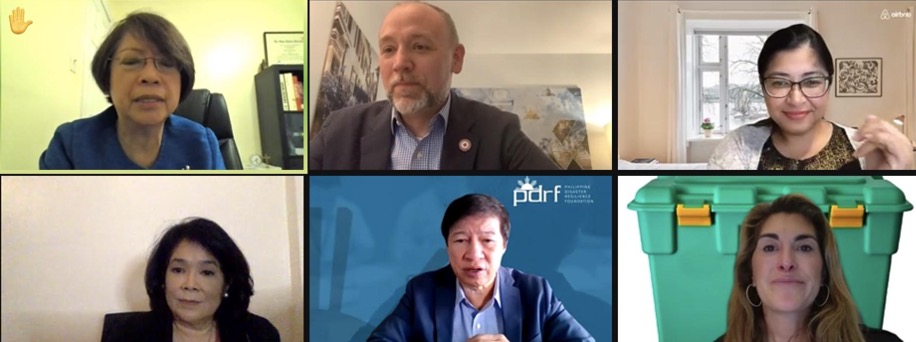PRESS RELEASE
WDC-32-2021
6 AUGUST 2021
WASHINGTON, D.C. – The Embassy of the Philippines, in collaboration with the American Red Cross, organized a webinar on 29 July 2021 entitled, Foundations and Futures: Harnessing PH-US Partnerships to Build More Disaster-Ready and Resilient Communities. It was held in observance of the Philippine National Disaster Resilience Month and in celebration of the 75th anniversary of the diplomatic relations between the Philippines and the United States.
Panelists included Mr. Rene Meily, President of the Philippine Disaster Response Foundation; Ms. Kerri Murray, President of ShelterBox USA; Ms. Victoria Navarro, Director of the Philippine Humanitarian Coalition; Ms. Lourdes Tiglao, former Strategic Partnerships Officer of Team Rubicon Global; and Ms. Maria Antonia Yulo-Loyzaga, President of the National Resilience Council. Mr. Trevor Riggen, Senior Vice President for Disaster Cycle Services of the American Red Cross, moderated the webinar.
In his opening remarks, Chargé d’Affaires a.i. Jaime Ramon T. Ascalon, Jr., emphasized the importance of partnerships especially in times of calamities, and highlighted the humanitarian assistance provided by the United States and partner organizations to the Philippines through the years.
The panelists shared their organization’s activities and programs, and how their collaborations with local communities, other organizations, and local as well as the national government, contributed to the success of their humanitarian efforts. They stressed the value of volunteerism and partnering with other organizations with similar objectives.
“There are many ways folks can engage no matter what your situation is like,” Ms. Tiglao said. Team Rubicon, a volunteer group that helps communities prepare, respond, and recover from disasters, provides purpose to its volunteer members through disaster relief. She highlighted that volunteerism goes a long way and no contribution is ever small. Team Rubicon was one of the first organizations to send volunteers to the Philippines when Typhoon Haiyan (Yolanda) hit the Philippines.
ShelterBox USA recognizes that the way to efficiently respond to the needs of disaster-hit communities is to work with the local community and utilize locally available resources. The organization considers shelter a basic need and that the first step to recovery is to have shelter immediately after a disaster strikes. Ms. Murray shared that ShelterBox USA provided emergency shelters and basic supplies to affected communities and families during Typhoon Haiyan and succeeding typhoons that hit the country.
In her presentation, Ms. Navarro emphasized the work that the Philippine Humanitarian Coalition (PHC) has done, and the group’s engagement with various organizations. The group was established in response to the destruction brought by Typhoon Haiyan (Yolanda). PHC continues to provide assistance to disaster-stricken communities to this day, and now prioritizes climate action. “This is now the time for us to move to the next step. It’s now time for prevention,” Ms. Navarro added.
Mr. Meily gave a presentation of the programs and achievements of the Philippine Disaster Resilience Foundation (PDRF), which highlighted the extent of assistance and programs for disaster management and recovery, such as the PDRF Operations Center, the first private sector-led national operations center in the world. PDRF, an organization of businesses which coordinates the private sector’s disaster management operations, aims to build a more disaster-resilient Philippines by harnessing its partnerships not only with private entities but with communities, government agencies, and humanitarian organizations. “The Philippines is way ahead of many other countries in partnerships, especially the private sector and civil society. We are so active because we’ve learned from our past disasters,” Mr. Meily added.
Ms. Maria Antonia Yulo-Loyzaga shared the work of the National Resilience Council aimed at building a resilient Philippines using science-based approach through partnerships with the public and private sector. In her presentation, Ms. Yulo-Loyzaga highlighted the importance of reframing the way we look at disasters. “With disaster and development, we regard disasters as not single discrete events. They’re the result of development patterns that have emerged over years. In fact, when we look at different hazards which expose the vulnerable, we ask, were these of human decisions putting people in harm’s way? So the issue really for us is, do we prepare to prevent or just continue to prepare to respond,” Ms. Yulo-Loyzaga said.
At the end of the webinar, Ms. Murray reiterated the importance of partnerships and collaborations in responding to disasters. “No single organization works alone. Collaboration is key,” Ms. Murray stressed.
The webinar highlighted that preparation for any disaster capacitates vulnerable communities to properly respond and immediately recover from any disaster, strengthened by the collaboration of all stakeholders. Mitigation and prevention is better achieved when communities, organizations, and global partners work together. ###



